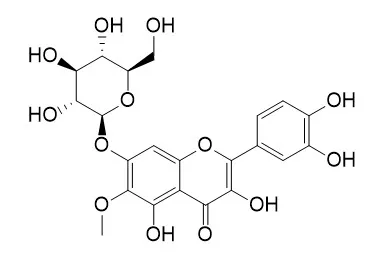| In vitro: |
| Evid Based Complement Alternat Med. 2017;2017:9602368. | | Larvicidal Activity against Aedes aegypti and Chemical Characterization of the Inflorescences of Tagetes patula.[Pubmed: 29362590 ] |
METHODS AND RESULTS:
The crude acetone extract (CAE) of defatted inflorescences of Tagetes patula was partitioned into five semipurified fractions: n-hexane (HF), dichloromethane (DF), ethyl acetate (EAF), n-butanol (BF), and aqueous (AQF). BF was fractionated by reversed-phase polyamide column chromatography, obtaining 34 subfractions, which were subjected to HSCCC, where patuletin and Patulitrin were isolated. CAE and the fractions BF, EAF, DF, and AQF were analyzed by LC-DAD-MS, and patuletin and Patulitrin were determined as the major substances in EAF and BF, respectively. BF was also analyzed by HPLC and capillary electrophoresis (CE), and Patulitrin was again determined to be the main substance in this fraction. CAE and the semipurified fractions (750, 500, 300, 100, and 50 mg/L) were assayed for larvicidal activity against Aedes aegypti, with mortality rate expressed as percentage. All fractions except AQF showed insecticidal activity after 24 h exposure of larvae to the highest concentration. However, EAF showed the highest activity with more than 50% reduction in larval population at 50 mg/L.
CONCLUSIONS:
The insecticidal activity observed with EAF might have been due to the higher concentration of patuletin present in this fraction. | | Nat Prod Res. 2012;26(17):1584-93. | | Determination of antioxidant activity of extracts and fractions obtained from Galinsoga parviflora and Galinsoga quadriradiata, and a qualitative study of the most active fractions using TLC and HPLC methods.[Pubmed: 22085305 ] | Taking into account the role of reactive oxygen species in the development of inflammation, and the application of the plants of genus Galinsoga Ruiz & Pav. in folk medicines for inflammatory states, we investigated and compared the antioxidant activities of particular Galinsoga extracts and fractions.
METHODS AND RESULTS:
The compositions of the most active fractions were studied using thin layer chromatography (TLC) and high-performance liquid chromatography (HPLC) methods. The extracts and fractions from Galinsoga parviflora Cav. and Galinsoga quadriradiata Ruiz et Pav. possess dose-dependent free radical-scavenging ability against DPPH• and superoxide radicals, as well as inhibitory effects on linoleic acid peroxidation in a manner comparable to gallic acid. In the most active fractions, flavonoids, Patulitrin, quercimeritrin, quercitagetrin and caffeoyl derivatives were detected.
CONCLUSIONS:
Our research demonstrates that the investigated herbs are an interesting source of preparations with significant antioxidant effects. Our results justify the use of both raw materials in inflammatory diseases, among others, due to their ability to prevent free radical-induced deleterious effects. |
|






 Cell. 2018 Jan 11;172(1-2):249-261.e12. doi: 10.1016/j.cell.2017.12.019.IF=36.216(2019)
Cell. 2018 Jan 11;172(1-2):249-261.e12. doi: 10.1016/j.cell.2017.12.019.IF=36.216(2019) Cell Metab. 2020 Mar 3;31(3):534-548.e5. doi: 10.1016/j.cmet.2020.01.002.IF=22.415(2019)
Cell Metab. 2020 Mar 3;31(3):534-548.e5. doi: 10.1016/j.cmet.2020.01.002.IF=22.415(2019) Mol Cell. 2017 Nov 16;68(4):673-685.e6. doi: 10.1016/j.molcel.2017.10.022.IF=14.548(2019)
Mol Cell. 2017 Nov 16;68(4):673-685.e6. doi: 10.1016/j.molcel.2017.10.022.IF=14.548(2019)